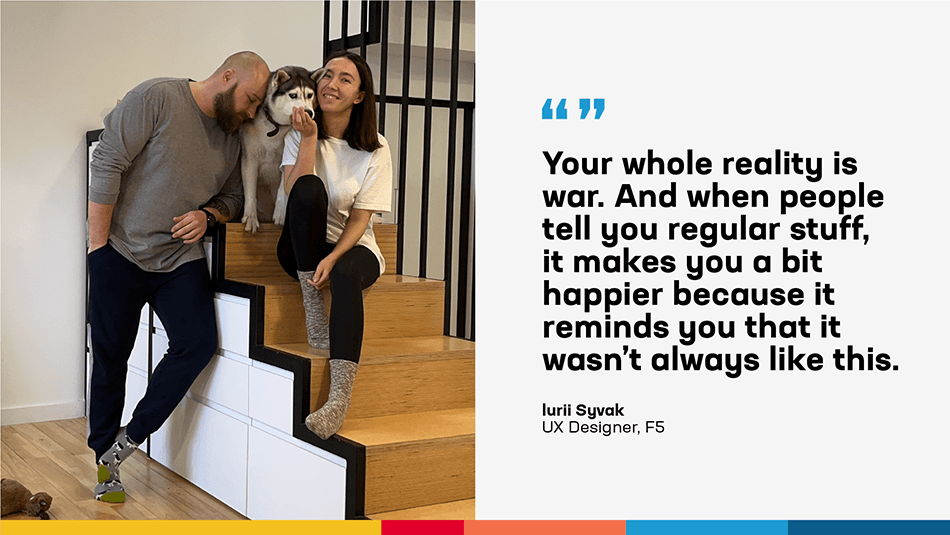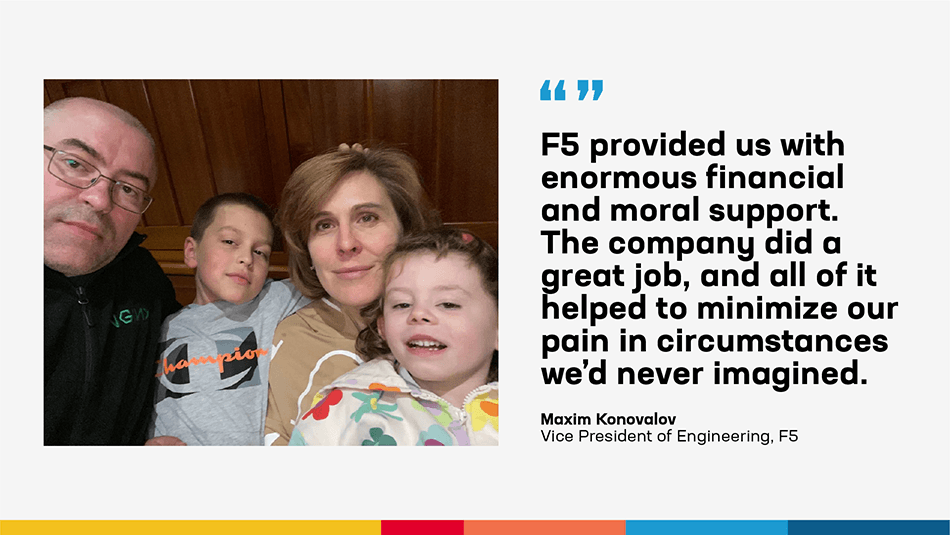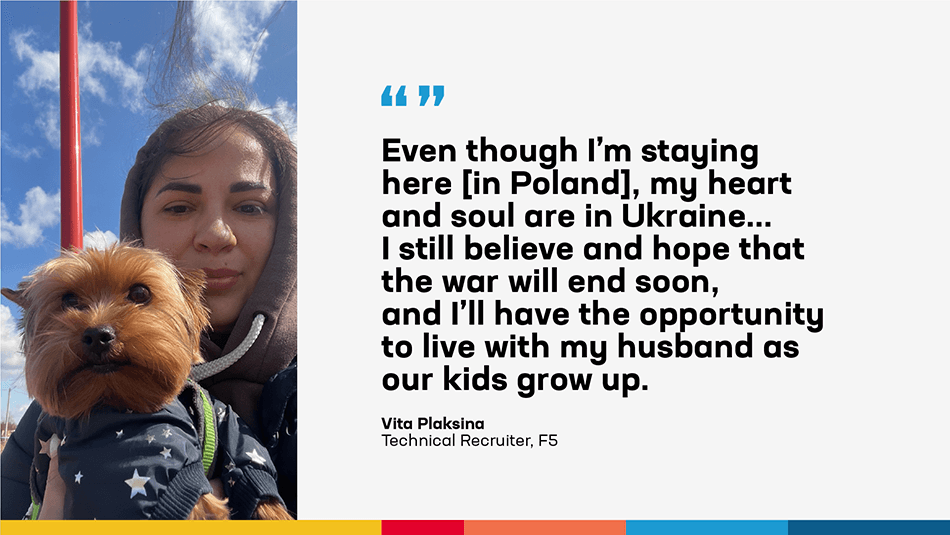Before the Russian invasion, Vita Plaksina worked as a contractor for F5 in Ukraine, living in Kyiv with her husband, children, and Yorkshire terrier. Her 10-year-old daughter was thriving academically, and her 5-year-old son was preparing to enter the first grade. She and her husband had just bought a summer home close to Kyiv and were planning a three-week vacation to Spain and Italy. “We were really coming into our own as a family,” she says.
Yet now, just one year later, Plaksina is living in Poland, her life and family uprooted. Her children are attending public school in Warsaw, struggling to adjust to a foreign culture. And she hasn’t seen her husband in more than nine months. Her husband is still in Ukraine, where men of fighting age were asked to remain. They talk whenever they both have Internet access, but the war continues, and they don’t know when they’ll be able to reunite.
““It’s such a challenging time for all of our Ukrainian and Russian employees and contractors, and I’m continually amazed by their courage and resilience.” ”
While Plaksina tries to make the best of her situation, it feels like her life is on hold. “Even though I’m staying here, my heart and soul are in Ukraine,” she says. “I’m happy to have a job and to provide a steady life for my children. But I still believe and hope that the war will end soon, and I’ll have the opportunity to live with my husband as our kids grow up.”
Plaksina is one of 29 F5 employees and contractors who were based in Ukraine or Russia when the fighting began in February 2022. As these F5ers grapple with the trauma of war, F5 has been extending a lifeline—providing everything from visa and relocation assistance for employees who choose to move to financial and mental health support for those who remain at home.
“As a human-first company, many of the corporate decisions we had to make became very straightforward,” says Ana White, Executive Vice President and Chief People Officer at F5. “It’s such a challenging time for all of our Ukrainian and Russian employees and contractors, and I’m continually amazed by their courage and resilience.”
Waiting out the war in Ukraine
Today, three of F5’s Ukraine-based contractors remain in the country, and the company is in close contact with each of them. One of these contractors is lurii Syvak, a user experience (UX) designer who lives in Ivano-Frankivsk, about 200 kilometers east of the Polish border.
Before the war started, Syvak had been planning to relocate to the Czech Republic with his girlfriend to take a full-time position with F5. But after the Russian invasion, males between the ages of 18 and 60 were prohibited from leaving Ukraine. Besides, Syvak wanted to help his mother and support his girlfriend’s elderly grandparents, all of whom decided not to leave the country.

In the first days after the conflict began, Syvak says life was chaotic and that people around him were focused on basic survival—securing enough food, medicine, cash, clean water, and gas for their cars. But as the months progressed, they’ve come to accept their new reality, turning their attention to helping with the war effort. Personally, Syvak has used his SUV to transfer food, medicine, and equipment to wherever they’re needed. And while he hasn’t been able to work, he’s maintained contact with his UX team, even inviting a Ukraine-based F5er and his family to use his apartment as they escaped the fighting in Kyiv.
Syvak says F5’s support for him and the other contractors in Ukraine has been “huge.” In the first days and months, HR professionals contacted him daily, sometimes multiple times a day, to provide information about potential attacks, help him find the supplies he needed, and make sure he and his family were safe. Now, a year later, he is still contracting with F5, making it possible for him to support his family. He’s also become close friends with several members of the HR team, who continue to check in several times a week to share photos and stories about their lives.
“Your whole reality is war,” Syvak says. “And when people tell you regular stuff, it makes you a bit happier because it reminds you that it wasn’t always like this. When other people have a normal life, it reminds you that you will have a normal life someday again, too.”
Relocating to the U.S. from Russia
F5 had already been relocating employees from its office in Moscow in the years before 2022, and once the war started, the company quickly decided to close its Russian office. Employees who decided not to move to an office location outside of Russia were offered a severance package. And those who chose to leave were rapidly relocated before flights out of Russia dwindled, along with the number of countries willing to welcome the displaced F5 employees.
“It was important for our Russian employees to know that they still had a place at F5 even though we were closing our Moscow office,” says White. “NGINX, in particular, has a rich history there, and we wanted to make sure that our teams had a path forward with the company outside of Russia, even in wartime.”
Maxim Konovalov, vice president of engineering, was one of eight employees in F5’s Moscow office at the time who made the decision to relocate. Konovalov says he left Russia because he’s adamantly against the war. At the same time, he wanted to preserve the team he had built at F5 and demonstrate to his colleagues that relocating was the right decision for both them and the company. “It wasn’t easy, and it’s still not easy, especially with children,” he says. “It’s hard to change your life when you’re almost 50—to give up your life in Russia and build everything from scratch somewhere else.”

Konovalov took a direct flight from Moscow to the United Arab Emirates with his wife and two children, working in F5’s Dubai office for a few months before relocating to the San Francisco area in August 2022. F5 helped Konovalov and his family obtain the necessary visas. The company also paid for his relocation costs and helped him and his family find temporary housing in California. “F5 provided us with enormous financial and moral support,” Konovalov says. “The company did a great job, and all of it helped to minimize our pain in circumstances we’d never imagined.”
Today, Konovalov works out of F5’s San Jose office. Before the war, he frequently traveled to the U.S. for business, which has made the adjustment easier. Yet both his wife and children have found it difficult to learn a new language and adapt to an unfamiliar culture. “Personally, I’d love to stay here,” Konovalov says, “but I’m not sure about my family. Ultimately, I’ll do whatever’s best for them.”
Moving to Poland for the time being
Plaksina says her decision to leave Ukraine for Poland was a gradual one. When the war first started, she and her family stayed in their Kyiv apartment, descending into an underground bomb shelter each time the air sirens went off. “Emotionally, it was such a shock, and we just couldn’t accept what was happening,” she says. “We wanted to believe the war would be stopped very soon.”
From the moment the invasion began, she says she received 24/7 support from F5’s HR team—even though her contract with the company was slated to end in just a few weeks. “They were asking how we were, if we were safe, if we wanted to move,” she says. “And they were telling us not to worry, that our contracts would be prolonged. It was just great support because we didn’t have to worry about our job or money during what was a very hard and confusing time.”

After a couple of weeks, Plaksina and her family decided to travel to western Ukraine, where it was safer and where they could live with relatives. Yet even there, electricity was sporadic, she wasn’t able to work, and it felt like “life had completely stopped.” Her husband eventually returned to Kyiv to resume his job in the automotive industry, and Plaksina decided to move out of Ukraine so her children could continue school away from the constant reminder of war. She chose Poland, the closest country to Ukraine, and worked with F5 to secure a full-time role.
“The whole time I was in very close contact with HR on a daily basis—during the day and even at night,” Plaksina says. “I was really happy that they proposed this role and provided the aid for my relocation. Moving to another country with a job has made everything so much easier.”
Plaksina, her children, and the Yorkshire terrier now live in an apartment that F5 helped her find. She works as a full-time HR recruiter in F5’s Poland office, where she says everyone has been “very nice and welcoming.”
Plaksina looks forward to the time when she can reunite with her husband—and hopes it won’t be too long. In the meantime, F5 continues to help her and others navigate deeply challenging circumstances as the war enters its second year.
“When you see the human-first attitude from your teammates, from your managers, and even the VPs, you realize this is a special culture, and one that you really want to be part of,” she says. “I feel protected as an employee and as a person—and I can’t even tell you how important that’s been for me during this difficult time.”
About the Author
Related Blog Posts

Why sub-optimal application delivery architecture costs more than you think
Discover the hidden performance, security, and operational costs of sub‑optimal application delivery—and how modern architectures address them.

Keyfactor + F5: Integrating digital trust in the F5 platform
By integrating digital trust solutions into F5 ADSP, Keyfactor and F5 redefine how organizations protect and deliver digital services at enterprise scale.

Architecting for AI: Secure, scalable, multicloud
Operationalize AI-era multicloud with F5 and Equinix. Explore scalable solutions for secure data flows, uniform policies, and governance across dynamic cloud environments.

Nutanix and F5 expand successful partnership to Kubernetes
Nutanix and F5 have a shared vision of simplifying IT management. The two are joining forces for a Kubernetes service that is backed by F5 NGINX Plus.

AppViewX + F5: Automating and orchestrating app delivery
As an F5 ADSP Select partner, AppViewX works with F5 to deliver a centralized orchestration solution to manage app services across distributed environments.
F5 NGINX Gateway Fabric is a certified solution for Red Hat OpenShift
F5 collaborates with Red Hat to deliver a solution that combines the high-performance app delivery of F5 NGINX with Red Hat OpenShift’s enterprise Kubernetes capabilities.